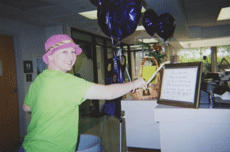Trials in life can be looked upon as storms. Many times they are sudden, unexpected and test a person’s character. Breast cancer was that storm for two members of the Nicholls family. Through the wind and rain they were able to overcome their obstacles and experience life after the storm calmed.
Alumna and graduate student Jessica Cassard, who is an English and world geography teacher at Thibodaux High, was diagnosed with breast cancer at age 29 in February 2005.
After performing her first self-examination, Cassard noticed a lump in one of her breasts.
“I have no idea why I decided to check,” she says. “Maybe is was karma.”
At the time of her diagnosis, Cassard was the youngest breast cancer patient any of her doctors had met.
“The doctors I saw leading up to the definitive test to determine if I had cancer said, ‘No, there’s no way. You’re too young, but we’re going to do the test anyway,'” she says. “And they were floored.”
After having a routine mammogram, Sue Gremillion, communicative disorders assistant professor, received confirmation of her diagnosis while on campus in September 2001.
“I was shocked because I didn’t think there was a problem,” Gremillion says. “There was no family history of breast cancer.”
One week after the lumpectomy, doctors told Gremillion the tumor was larger than they anticipated and recommended a total mastectomy, she says. However, she sought a second opinion and instead had her lymph nodes under her right arm removed.
Gremillion says she went through four chemotherapy treatments and about 35 radiation treatments, which ended in April 2002.
“The most difficult thing was knowing that you had it and wondering if you would survive,” she says.
Learning to rely on others was the most challenging aspect of Cassard’s illness, she says.
“I’m a single mom, so the hardest part was having other people take care of me and my son,” she says. “That was something I wasn’t used to; I’m very independent.”
Both women say losing their hair was difficult.
“I haven’t cut it at all since,” Cassard, whose curly hair is now shoulder-length, says. “I know how bald men all over the world feel.”
Gremillion says losing her hair was a struggle, but because she went through chemotherapy primarily in the winter she was able to wear hats and scarves.
Despite their struggles, both Cassard and Gremillion say they found some positives in their circumstances.
Gremillion continued to work at Nicholls throughout her illness and says the faculty and students supported her.
“When it was time for Race for the Cure, my students donated to the Susan Kohmen Foundation in my honor, which was very special,” Gremillion says.
A few weeks before her diagnosis, Gremillion says her husband was hospitalized with cerebral hemorrhage. She says over the months of being ill, she and her husband “got better together.”
“I think in a lot of ways it brought us closer together so that we would value each other, and it made us realize how important life is,” Gremillion says.
For Cassard, she says the positive aspect of being diagnosed at 29 was two-fold.
“The positive thing about having it at a young age was that I was healthy enough to go through everything without any bumps in the road,” she says. “Throughout surgery, chemotherapy and radiation I had no problems or complications.”
Cassard also says the experience motivated her to get her priorities straight.
“I’m not waiting until the end of my life to do things,” she says. “I’m able to tell people ‘no,’ and I know that my time is valuable.”
Both women attend Race for the Cure annually.
“What I like about Race is the people there, the enthusiasm and seeing so many women that have survived,” Gremillion says.
Cassard volunteered for both Race for the Cure and Relay for Life before her diagnosis, but since then she says she only attends.
“I’m the youngest one there, and that’s hard,” Cassard says. “I’m excited that Race is Saturday. I attend, but I need to be able to leave if I have to.”
Cassard did meet with other breast cancer survivors her age at a conference in February in Denver, Co. for breast cancer survivors younger than 40.
“I wanted to meet other people my age because around here I know no one,” Cassard says. “It’s just me and older people who are dealing with other issues, whereas for me, fertility is an issue. I wanted to go to workshops that specifically discussed fertility and sexuality.”
Both Cassard and Gremillion recommend women be aware of their breast health.
“When I was growing up, you never heard of breast cancer,” Gremillion says. “Now it’s more common than you think.”
Cassard says age should not be a factor in determining when to be concerned about one’s health and wellbeing.
“You really are never too young to start taking care of your own personal health,” she says. “Something told me something wasn’t right. Listen to yourself because you’re probably right.








